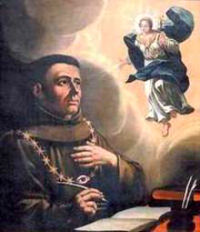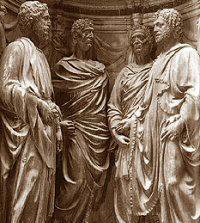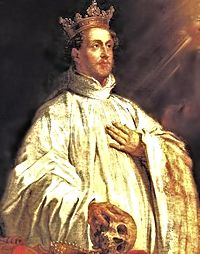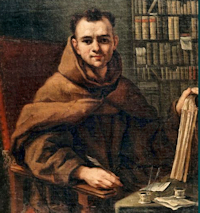Make your gift today!
Help keep Catholics around the world educated and informed.
Already donated? Log in to stop seeing these donation pop-ups.
Ordinary Time: November 8th
Friday of the Thirty-First Week in Ordinary Time; Bl. John Duns Scotus, priest
Other Commemorations: Bl. John Duns Scotus, Religious (RM); Holy Four Crowned Martyrs (RM); St. Godfrey, Bishop (RM)
» Enjoy our Liturgical Seasons series of e-books!
Newly beatified in 1993 by St. John Paul II, the Franciscans and other particular calendars may celebrate the optional memorial of Blessed John Duns Scotus, a Scottish Franciscan priest and theologian who died in 1308. He was the founder of the Scotistic School in Theology, and until the time of the French Revolution his thought dominated the Roman Catholic faculties of theology in nearly all the major universities of Europe. He is chiefly known for his theology on the Absolute Kingship of Jesus Christ, the Immaculate Conception of the Blessed Virgin Mary, and his philosophic refutation of evolution. He is also known as the "Doctor of Mary Immaculate" because of his defense of the Immaculate Conception.
According to the 1962 Missal of St. John XXIII the Extraordinary Form of the Roman Rite, today is the commemoration of the Holy Four Crowned Martyrs, a group of five Christian sculptors of Hungary, martyred under Diocletian in 306. Their bodies were taken to Rome, where a biographer's error confused them with four martyrs of Albano. The basilica of the four crowned saints, built on the Coelian Hill, is one of the most characteristic of medieval Rome.
Don't forget to pray for the Poor Souls in Purgatory from November 1 to the 8th.
Blessed John Duns Scotus
 John Duns Scotus was probably born in the winter of 1266 in the South of Scotland. Around 1279 he was accepted in a Franciscan friary in South Scotland. After eight years of preliminary studies in philosophy, or rather in the artes, at Oxford, he started to study theology there in 1288. Having attained the age of 25 he was ordained a priest in Northampton on March 17th 1291.
John Duns Scotus was probably born in the winter of 1266 in the South of Scotland. Around 1279 he was accepted in a Franciscan friary in South Scotland. After eight years of preliminary studies in philosophy, or rather in the artes, at Oxford, he started to study theology there in 1288. Having attained the age of 25 he was ordained a priest in Northampton on March 17th 1291.
In the academic year 1297-98 John Duns prepared his first theological course which would change his life. During the next year he gave this course, on the Sentences of Peter Lombard, the most important textbook of systematic theology at the time. During these years (1297-99) Duns wrote Lectura I-II, his lecture notes on the two first books of the Sentences. Scotus' course based on these notes not only impressed his audience very much, but also the Franciscan leadership, and established his name as an exceptionally penetrating and original thinker.
In the summer of 1301 Scotus had fulfilled all the requirements for being a master (magister). However, he was sent to Paris by the Franciscan leadership in order to continue a Parisian career, at the most prestigious university of Europe.
After having again taught on the Sentences for a year, he and some of his colleagues were banished in June 1303 from Paris because of a conflict between the French king Philip IV and Pope Boniface VIII. He returned to his studium at Oxford and probably spent the first half of 1304 in Cambridge.
At the end of the summer of 1304 he was already back in Paris where he became professor of theology in 1306. Duns Scotus and his socius continued to work very hard on his Ordinatio together with a staff of assistants. The Ordinatio was meant to be the definitive edition of his Commentary on the Sentences. For this edition he used his Lectura I-III and Reportatio Parisiensis IV and piles of other materials he had prepared in the meantime.
In 1307 Duns leaves Paris again, but this time he left for Cologne in order to become the professor of theology at the Franciscan House of Studies (Studium). On November 8, 1308 he suddenly died in Cologne, leaving behind quite a number of unfinished works, including his Ordinatio.
—Excerpted from Research Group John Duns Scotus
Highlights and Things to Do:
- Learn more about Blessed John Duns Scotus
- Read A Treatise on God as First Principle by Bl. John Duns Scotus.
- Because of his clear writings on the defense of the Immaculate Conception, the Holy Father Pope Pius IX drew from his work and solemnly defined the Immaculate Conception of Mary in 1854. See Duns Scotus, Defender of the Immaculate Conception, by Father Berard Vogt.
- See Depictions of John Duns Scotus.
- Bl. John Duns Scotus is buried in the Church of the Immaculate Conception, a Friars Minor church (Minoritenkirche) in Cologne, Germany.
Holy Four Crowned Martyrs (Severus, Severian, Carpophorus & Victorinus)
 The history of these holy martyrs is somewhat confusing. The Martyrology has this: "At Rome on the Via Lavicana the day of the death of four holy martyrs, the brothers Severus, Severianus, Carpophorus, and Victorinus. Under Emperor Diocletian they were scourged to death with lead rods. Their names were first made known many years later through a divine revelation. As no one knew their names previously, the annual feastday to their honor was celebrated under the title: The Four Crowned Brothers. The designation was retained even after the revelation."
The history of these holy martyrs is somewhat confusing. The Martyrology has this: "At Rome on the Via Lavicana the day of the death of four holy martyrs, the brothers Severus, Severianus, Carpophorus, and Victorinus. Under Emperor Diocletian they were scourged to death with lead rods. Their names were first made known many years later through a divine revelation. As no one knew their names previously, the annual feastday to their honor was celebrated under the title: The Four Crowned Brothers. The designation was retained even after the revelation."
The basilica of the Four Crowned Martyrs also contains the relics of five sculptors who under Diocletian refused to make idols or to venerate sun-god pictures. Reports say they were scourged, placed in lead coffins and submerged in a stream (c. 300). Hagiographers are trying to disentangle the conflicting statements on the relation of these two groups to one another, whether two groups actually existed, whether they were Pannomians or Romans, soldiers or stone-masons, etc.
—Excerpted from The Church's Year of Grace, Pius Parsch
Patronage: against fever; cattle; masons; sculptors; stone masons; stonecutters
Highlights and Things To Do:
- Visit the ancient Roman basilica Sant Quattro Coronati.
- Read more about the Four Crowned Martyrs:
- They are buried in the Basilica of Santo Stefano al Mount Celio, Rome, Italy.
St. Godfrey of Amiens
 St. Godfrey was born into the wealth and prestige of the counts of Cappenberg. In his early adulthood he played an active role in supporting the cause of the Roman Pontiff against Emperor Henry IV.
St. Godfrey was born into the wealth and prestige of the counts of Cappenberg. In his early adulthood he played an active role in supporting the cause of the Roman Pontiff against Emperor Henry IV.
In 1121 he encountered St. Norbert at Cologne and was so struck by his lifestyle and preaching that he immediately made plans to give away all his possessions and enter the infant Norbertine Order. Together with his brother Otto and his wife Judith, he handed over Cappenberg Castle to St. Norbert on May 31, 1122, thus establishing the first foundation of the Order in Germany. Both Otto and Judith followed Godfrey’s example and embraced the religious life of the new Order. The further donation of his estates at Varlar and Ilbenstadt to St. Norbert caused an uproar among the local nobility who viewed it as a threat to their established aristocracy. Under the leadership of Godfrey’s hostile father-in-law, Frederick of Arnsberg, an unsuccessful military assault was made upon the new monastery at Cappenberg. Through all of these trials Godfrey remained steadfast in his desire to be a Norbertine.
When things calmed down, Godfrey received the habit from the hand of St. Norbert. He especially loved to care for the poor and sick in the hospital attached to the abbey. St. Norbert wanted to have him by his side at Magdeburg, but Godfrey felt out of place in the noisy northern metropolis and was granted permission to return to Cappenberg. It was on his way back to Mt. Cappenberg that Godfrey fell sick at Ilbenstadt. Surrounded by his brethren and his brother Otto, he made peace with them all: “My brothers, through love for the Order, through zeal for the glory of God, I have occasionally reprimanded some of you a bit too harshly. I beg pardon from you now.” Moments later, seeing a vision of angels, Godfrey exclaimed, “How beautiful! How beautiful! The messengers of my Creator and God have finally come!” With that he fell asleep in the Lord. It was January 13, 1127.
—Excerpted from Norbertine Vocations
Highlights and Things To Do:
- Read more about St. Godfrey:
- Find out more about the Norbertine Order, which is also called Premonstratensian Fathers, Canons Regular of Prémontré, and White Fathers. There are several monasteries in the United States, including St. Norbert Abbey in De Pere, Wisconsin and St. Michael's Abbey in Silverado, California.
Visiting a Cemetery: An indulgence, applicable only to the Souls in Purgatory, is granted to the faithful, who devoutly visit a cemetery and pray, even if only mentally, for the departed. The indulgence is plenary each day from November 1-8; on other days of the year it is a partial indulgence.
Visiting a Church on November 2: A plenary indulgence, applicable only to the souls in purgatory, is granted to the faithful who, on All Souls' Day (or, according to the judgment of the ordinary, on the Sunday preceding or following it, or on the solemnity of All Saints), devoutly visit a church or an oratory and recite an Our Father and the Creed.
Praying for the Faithful Departed: A partial indulgence, applicable only to the souls in purgatory, is granted to the faithful who,
- devoutly visit a cemetery and at least mentally pray for the dead;
- devoutly recite lauds or vespers from the Office of the Dead or the prayer Eternal rest. (Manual of Indulgences, fourth edition, 1999)
Indulgence Requirements:
- To gain a plenary indulgence, in addition to excluding all attachment to sin, even venial sin, it is necessary to perform the indulgent work and fulfill the following three conditions: sacramental Confession, Eucharistic Communion, and prayer for the intention of the Sovereign Pontiff.
- A single sacramental confession suffices for gaining several plenary indulgences, but Holy Communion must be received and prayer for the intention of the Holy Father must be recited for the gaining of each plenary indulgence.
- The three conditions may be fulfilled several days before or after the performance of the prescribed work; it is, however, fitting that Communion be received and the prayer for the intention of the Holy Father be said on the same day the work is performed.
- The condition of praying for the intention of the Holy Father is fully satisfied by reciting one Our Father and one Hail Mary. A plenary indulgence can be acquired only once in the course of the day, a partial indulgence can be acquired multiple times.
- If a visit to a Church or an oratory is required to obtain an indulgence attached to a particular day, this may be accomplished from noon of the preceding day until midnight of the particular day.
Manual of Indulgences, fourth edition, 1999 (Enchridion Indulgentarium)






